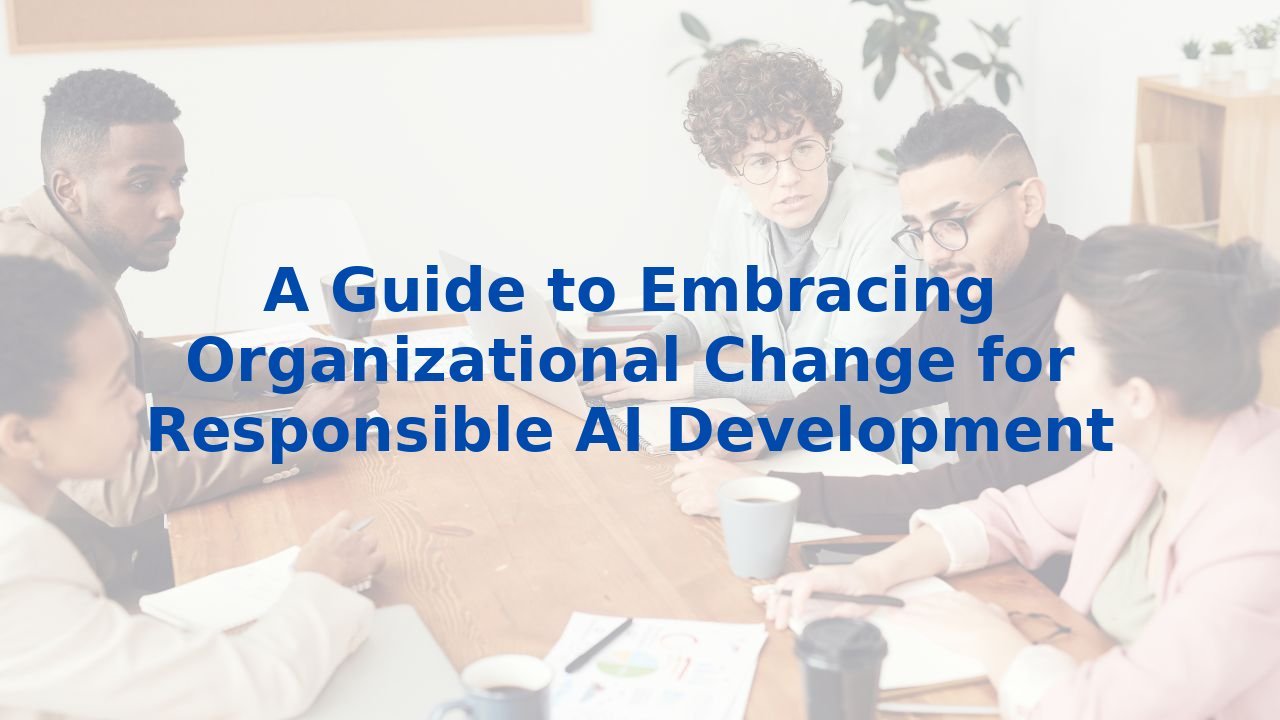A Guide to Embracing Organizational Change for Responsible AI Development
A Guide to Embracing Organizational Change for Responsible AI Development
Introduction
The integration of artificial intelligence (AI) into business operations represents a transformative shift, meaning that organizations must adapt not just their technologies, but their cultures and processes as well. This journey is not only about harnessing new capabilities; it’s about reshaping how organizations function, and fostering a greater sense of responsibility in AI application. In this article, we’ll explore the essential organizational changes needed to promote responsible AI development and highlight the numerous benefits that AI can deliver in enhancing efficiency.
The Shift to a Data & AI-Driven Organization
To adapt to this new landscape, traditional views on change management must evolve. A "Data & AI-driven" organization signifies a profound reevaluation of how businesses operate. It requires the organization to take ownership of the accuracy and implications of its data. Integrating AI into the roles and responsibilities within the organization is essential, demanding an organizational culture that prioritizes informed decision-making.
Organizational Transformation with AI
AI is revolutionizing various organizational processes by enabling automation and facilitating more informed decision-making. This transformation not only brings significant efficiency gains but also cultivates a culture of continuous innovation. Businesses can leverage AI to optimize operations, reduce operational costs, and deliver products and services that are more in tune with customer needs.
Key Areas of Transformation
Operational Efficiency
AI enhances operational efficiency through technologies like machine learning and natural language processing, which streamline workflows and eliminate repetitive tasks. Organizations can allocate their time and resources to more strategic initiatives, fostering a nimble and proactive work environment.
Product Development
AI accelerates the product development cycle via predictive analytics and advanced machine learning techniques. This leads to expedited innovation, allowing businesses to respond rapidly to market trends and evolving customer preferences.
Decision-Making
AI equips organizations with actionable insights and recommendations, reducing reliance on guesswork. This capability empowers businesses to make more informed and accurate decisions that align closely with their strategic objectives.
Customer Experience
Through analyzing customer behavior, AI allows companies to personalize interactions, resulting in unparalleled customer satisfaction and loyalty. Understanding individual preferences not only enhances the customer experience but also builds a deeper emotional connection with the brand.
Benefits of AI for Organizational Efficiency
Time-Saving
By synthesizing data and identifying patterns, AI significantly reduces the time spent on analysis and decision-making. This leads to faster prototype testing and a more efficient workflow overall.
Cost Reduction
Through automation, organizations can optimize resource allocation and minimize waste. Predictive testing powered by AI also mitigates the need for costly rework during product development, leading to faster time-to-market and reduced overhead.
Improved Decision-Making
AI enhances the decision-making process by providing precise insights that filter through data noise. This increases the efficacy of gathering and understanding data, assisting leaders in making decisions that reflect the organization's strategic goals.
Enhanced Innovation
AI stimulates creativity and innovation by optimizing product features and streamlining the product management lifecycle. This ongoing commitment to innovation ensures that offerings remain competitive and relevant in a fast-paced market.
The Importance of Employee Training
To harness the transformative power of AI, organizations must prioritize employee training in AI literacy. This ongoing development will prepare employees to incorporate AI into their daily roles effectively. With robust training programs, organizations can:
Encourage AI Integration
Leadership’s commitment to championing AI initiatives, along with aligned HR policies, fosters a culture ready to embrace AI. Creating a supportive environment allows employees to see the value of AI in their workflows.
Develop AI Skills
Investing in technology and personnel training is paramount. By promoting AI skill development, organizations ensure they have knowledgeable individuals capable of managing the intricacies of AI technologies.
Promote Ethical Practices
Establishing clear governance frameworks helps manage the multifaceted risks associated with AI and maintains compliance with ethical standards. Effective communication about the benefits and ethical considerations surrounding AI reinforces the alignment of technological advancements with societal values.
Conclusion
The journey of integrating AI is more than a technical upgrade; it is a profound cultural shift that demands accountability and responsibility. Organizations that focus on transformation, efficiency improvements, and proactive employee training will not only embrace AI effectively but will emerge as leaders in responsible AI development. In doing so, businesses navigate this evolving landscape, enabling the use of AI to shape a brighter future for their operations and society as a whole.



